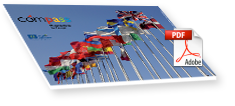How can the “COMPASS-competence chart“ be interpreted?
The “COMPASS-competence chart“ is divided into 4 competence fields which reflect different areas of action of a work placement abroad:
|
Language Competence |
Professional skills |
||||
|
Ability to communicate with and understand people in the host country |
Ability to interactively apply work procedures, methods, machines and tools in a different cultural environment |
||||
|
Listening |
Speaking |
Dialogues |
Competence in the field of mathematics/science |
Media literacy |
technical competence |
|
Social skills |
Personal skills |
||||
|
Ability to familiarise with and communicate in a different cultural environment |
Ability to shape the personal living environment in a different cultural environment |
||||
|
Ability to integrate |
Ability to work in a team |
Ability to judge and shape |
Problem-solving capacity |
Initiative / Planning capacity |
Self-assessment Perception by third parties |
To facilitate the differentiation of capacities, the COMPASS Competence Chart includes 6 horizontal levels. They are based on the levels laid down in the European Qualification Framework (EQF) and reflect in an ascending order the ability to solve tasks and problems in an autonomous, , goal-oriented and responsible manner:
|
EQF-Competence definition |
COMPASS-Level |
Target group |
|
Working or learning with direct guidance within a pre-structured context |
1 |
People in initial vocational training (IVT) |
|
Working or learning under guidance involving a certain level of autonomy |
2 |
People in initial vocational training (IVT) |
|
Responsible for the completion of assigned work or learning tasks. Ability to adapt one’s behaviour to the respective circumstances. |
3 |
People in initial vocational training (IVT) |
|
Acting autonomously within the action parameters of work and learning contexts, which, as a rule, are known, but could be subject to change. Supervising routine work of others, assuming a certain responsibility for the assessment and improvement of work or learning activities. |
4 |
People on labour market (PLM) |
|
Guiding and supervising in work and learning contexts with unforeseen changes; verification and development of one’s own performance and that of third parties. |
5 |
Expert and teaching staff in vocational education and training (VET-pro) |
|
Leading of complex technical or professional activities or projects and assumption of responsibility to make decisions in unforeseeable work or learning contexts. Assumption of responsibility for the occupational development of individuals or groups of people. |
6 |
Expert and teaching staff in vocational education and training (VET-pro) |
In total, the “COMPASS-Competence Chart“ has 72 “Can Descriptions“ as identifiers of competences.
Deliberately, their depiction is very general so that they can be applied to as many work areas and types of mobility projects as possible.
However, it is possible to vary the number of “Can Descriptions“ within the scope of competence descriptions or to adapt them to the specific occupations to align the information about the mobility participants’ competence profiles to occupational requirements and objectives of a mobility project or training
In spite of the reference to the “Key Competences for lifelong Learning“ and the levels of the “European Qualification Framework“, the COMPASS Competence Chart does not aim at constituting a generally accepted definition basis. The system mainly provides a frame of reference with learning achievements being allocated to competences and being visualised in a comprehensible way. This is mainly done to show the interaction of individually acquired, intercultural competences to be used at work and the gain of professional skills acquired abroad.
The additional benefit of the COMPASS Competence Chart is that with the help of the Can Descriptions, it is possible to word learning objectives in relation to competences, which makes it easier to determine the competence fields to be focused on, to make respective competence gains transparent and to document them.
When determining learning objectives and curricula of a mobility project, the sending and hosting organisations will have to arrange whether the learning achievements made abroad can be approved with regard to the qualification.









